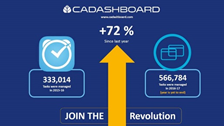CADASHBOARD – SEE A DASHBOARD FOR YOUR BUSINESS
Issue #116
COMMUNICATION
COMPLIANCE
COLLABRATION


State Bank of India cuts home loan interest rates to lowest in 6 years
SBI has cut home loan rates to a 9.1% - the lowest in six years - as part of a festive scheme. The rate cut comes on the back of a general interest rate reduction last week when SBI reduced its benchmark rates by 15 basis points.For festival scheme, home loans for women will be available for 20bps above the benchmark rate, which translates into 9.1%. For all other borrowers, home loans will be available at 9.15%. The festival rates will be available for loans sanctioned in Nov & Dec-16 and where disbursement is in a month.
India to launch clean energy equity fund of up to $2 billion: Sources
The Indian government and three state-run firms will jointly set up an equity fund of up to $2 billion for renewable energy companies to tap into to help New Delhi meet its clean energy goals, two government sources told Reuters on Wednesday.
Private and public companies will be able to dip into an initial amount of more than $1 billion starting next fiscal year, said the sources with direct knowledge of the decision taken after a meeting of government officials more than a month ago. India's government hopes the Clean Energy Equity Fund (CEEF) will attract pension and insurance funds from Canada and Europe.

- Sushil Chandra takes the charges as CBDT chairman..
- Final GST rates are out. Slabs fixed @ 5%, 12%, 18% and 28%
- New “Benami” act to take effect from 1-Nov-16
- Salaried Tax payers to get SMS alerts on their TDS deductions.
- 3.2 million Debit Cards compromised: SBI,HDFC, ICICI, YES Bank & Axis worst hit.
- IT Dept. changes PAN rules for Automobile Sales above 2 Lakhs.
- Public notice has been issued in the matter of wrong marketing of ICAI course by private colleges/ educational institutes..
- ICAI to introduce open books in CA exams.
- HC orders ICAI to suspend CA firms for issuing a false certification

International Section
Standard Chartered cuts unwanted loans by $13bn, including Essar
Standard Chartered said its liquidation portfolio of loans it no longer wants was reduced by US$13bn last month, marking a major step in its turnaround plan. A trading update on Tuesday showed the bank still faces a number of problems, however. It revealed it is under scrutiny from Hong Kong regulators for its advisory work on a 2009 initial public offering and said markets in Asia remain tough.
Bangladesh forex reserves rises to record $31.90 bn
Bangladesh's foreign exchange reserves hit a record $31.90 billion at the end of October, the central bank said on Tuesday, on the back of steady garment exports. The reserves, sufficient to cover about nine months' worth of imports, are $4.32 billion higher than in the same period last year.

Industry welcomes new GST rates
India finalised a four-tier Goods and Services Tax (GST) structure – ranging from 5% to 28% – taking a significant step towards implementing the biggest reform of indirect taxes, which the government hopes will shield the common man from price shocks.
The fixing of rates by the GST Council marks a crucial milestone towards the rollout of the single tax that will replace various state and central levies and create a seamless national market for goods and services.
The four GST slabs are 5%, 12% 18% and 28%. The fifth rate for gold and precious metals, which was earlier proposed at 4%, will be decided later but is likely to be lower.
“We are moving as per schedule-…We have been able to finalise the GST tax structure,” Finance Minister Arun Jaitley told reporters at the end of the first day of the two-day GST Council meeting in New Delhi. Industry welcomed the decision on the GST rates, which it said was a mixed bag.
“Over time, the government should commit to converge to one or two rates,” the Confederation of Indian Industry said in a statement. “It is also important that the bulk of goods and services should fall within the standard rate of 18% and only as exception to go to the higher rate of 28% and a lower rate for essential goods such as unprocessed food items.”
The Centre’s original proposal of 6% as the threshold rate and 26% as the highest slab was tweaked after states including Kerala said they wanted the lowest slab at 5%, the current threshold rate for value-added tax in many states. GST would be broadly tax-neutral, Jaitley said. The minister said he hoped the total indirect tax incidence on the people would come down with the seamless input tax credit that would reduce effective tax on goods.
AAM AADMI BURDEN
The aam aadmi’s grocery bill may not rise as the GST Council, the apex decision-making body for the tax, decided to exempt food items or keep most of them at the lowest rate of 5%. More than 50% of the items in the Consumer Price Index basket would be exempted under GST and the remainder placed in the lowest bracket. Exempted items won’t have the benefit of input tax credit.
Sports utility vehicles, aerated drinks, pan masala and tobacco products are unlikely to see any change in their overall tax burden with a new cess proposed on them. obacco currently attracts a total tax of about 65% and for aerated drinks, the current rate is about 40%. These goods will be taxed at the highest rate of 28% and topped up with a cess to raise the effective tax.
Read more Info : http://economictimes.indiatimes.com/articleshow/55234112.cms?utm_source=contentofinterest&utm_medium=text&utm_campaign=cppst
Judgements/Tribunals
Content right to :eJurix

M/s. Group M. Media India Pvt. Ltd. Mumbai Vs. The Union of India & Ors. (HC-BOM) (15 Oct, 2016)
Held: Challenges the inaction/failure on the part of the Assessing Officer in processing the return of income - The CBDT has itself issued Instruction No.7/2012, dated 1st August, 2002 wherein they have specifically directed the officers of the Revenue to process all returns in which refunds are payable expeditiously. Similarly, as late as in 2014 in the Citizen's Charter issued by the IT Dept.in its vision statement states that the Department aspires to issue refunds along with interest under Section 143(1) of the Act within 6 months from date of electronically filing the returns. The return was filed on 29th November, 2015.The Officers of the Revenue seem to believe that it is not enough for the assesses to please the deity (Income Tax Act) but the assesses must also please the priest (Income Tax Officer) before getting what is due to him under the Act. The powers of a Court under Article 226 of the Constitution of India are not limited only to prerogative writs but also to issue any direction or order for doing justice. Therefore, Article 226(1) of the Constitution empowers the Court to issue directions, orders or writs, including writs in the nature of habeas corpus, mandamus, certiorari or any of them. Writ Petition allowed.

Cairn India Limited & Ors. Vs. Directorate General Of Foreign Trade & Ors.(HC-Delhi) (18 Oct, 2016)
Held: Petitioners get the right to lift and export their Participating Interest share of Crude Oil and condensate only when a notice of self- sufficiency is given by Government to the petitioners and that too, subject to Govt. exercising an option under Article 18.4 to purchase the entire production. Even if it is assumed that the requirement of India having attained self-sufficiency was dispensed with, it was on the condition that unutilised crude oil would be sold to domestic private refineries. No particular domestic refinery was named. A further condition that crude oil would be sold at International price was also imposed. If petitioners are being forced to sell at a price lower than the International price, it is free to invoke the dispute resolution mechanism in the contract. Loss to the exchequer is presumptuous and a disputed question of fact as according to the respondent-UOI the crude generated by the petitioners is Dated Brent and not Bonny Light. This is all the more relevant as it is an admitted position that the crude oil generated by the petitioners is of very heavy quality, high viscosity and wax with high pour point and residues. Writ petition dismissed.

M/S Shalibhadra Developers Vs. Secretary.(HC-Guj)(18 Oct, 2016)
Held: The views of Bombay High Court and Delhi High Court was divergence. Bombay High Court holds, the date of service of assessment order is the crucial date only after which application for settlement could not be filed. According to Delhi High Court the crucial date would be the date of dispatch of the order and not the date of its service. To follow the line adopted by either of the High Courts in noted decisions, However, if such interpretation is accepted, it would lead to grave conflict. As noted, in a situation where an order of assessment is already passed, but neither dispatched nor served to the assesses, application for settlement would be maintainable, the Settlement Commission would have the exclusive jurisdiction to pass appropriate order in terms of section 245D and other provisions of the Act. At the same time order of assessment which has been passed would survive without any mechanism for either annulling such order or providing for primacy of the order of Settlement Commission. The legislature cannot and has not intended to give rise to two parallel orders pertaining to the same period of assessment by two authorities, both may be competent at the time when they were passing the orders. Petitions dismissed.
Blog

On Time Compliance – Must for Business
A stitch in time is better than nine…….and there are no free lunches!
Something similar is the case when you run an enterprise irrespective of its size, worth, activity and similar considerations. Governments the world over see businesses from a different perspective compared to an individual as regards legal and tax liabilities. Businesses are established with express intention to earn profits. No business runs on a charitable intent. How-so-ever noble the intent, a functioning enterprise is the result of profits and incomes out of its operations.
Unlike an individual who functions to keep self and immediate family going or for that matter a not-for- profit enterprise intending to uplift humanity, a business run purely on commercial lines has an unwavering focus on returns. With the larger intent of distributing resources equitably
amongst society, the executive under the express instructions of a duly elected government is supposed to tax enterprise, how-so-ever small and distribute the same for the larger good. Examples of larger good may include things like educational institutions, grain storage, transport and telecom infrastructure, hospitals and healthcare etc.
Given this outlook, tax and related legal entities has an unrelenting view on non-compliance. You either pay on time…..or pay a penalty and pay your dues or worse still go behind bars….and still pay. The choice is yours….after all it is your business and your hard-earned reputation! The latter takes years to regain once lost to legal wrangles. Both time and money can come back (in parts if not whole) but a name and reputation built over years of hard work never really comes back once lost. The ongoing case of a reputed Indian Conglomerate which prides itself for its patriotic fervor though its owner is behind bars for the last one year is the perfect case in point. As is evident, they have lost money, opportunity and most of all, reputation and people’s goodwill. Reason? Omission (willful or otherwise, we can never know) in informing the authorities about money being borrowed from the public in all of its.
Yes, in today’s industrial and legal scenario with IT and systems being the corner stone instead of human intervention which is fraught with subjectivity, it is increasingly possible for defaulting entities to be hauled over the coals. What then is the way out?
Experience….and some nifty technology shows that the best way to stay out of these sticky situations is to be one-up on them.
To read more please visit
https://www.cadashboard.com/blogs/on_time_compliance_must_for_business

We are reaching out !!!
Application towards the perfection.
Improved Usage - ramble in no time.


A Chemist, an Engineer and an Economist
A chemist, an engineer and an economist are stranded on a deserted island. They carry with them some canned food but have no ordinary means of opening the cans. The chemist suggests gathering some wood and starting a fire and then holding the cans over the heat, counting on the expanding contents to burst open the cans. The engineer thinks it would be better to try smashing the cans open with some of the rocks lying around. The economist begins, "Assume we had a can opener..."